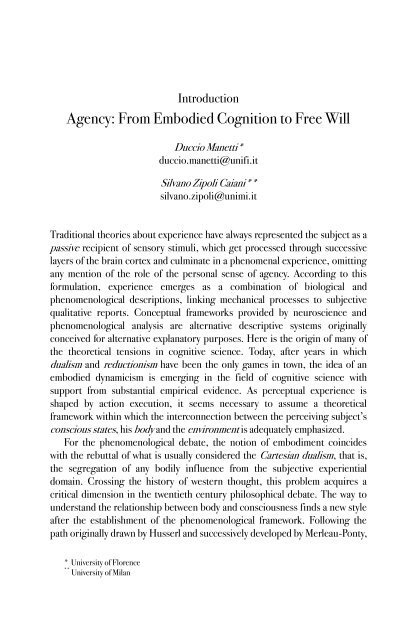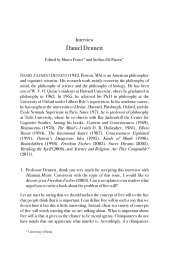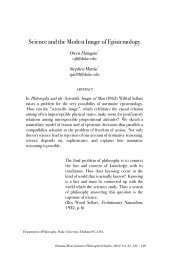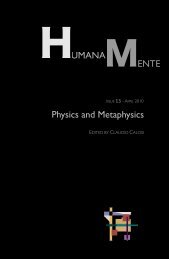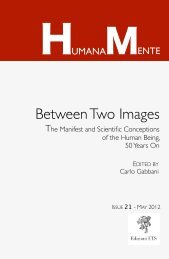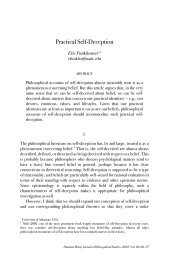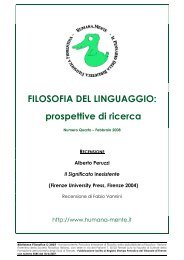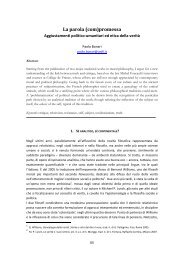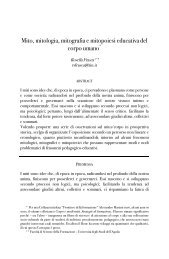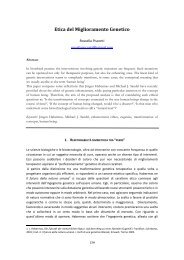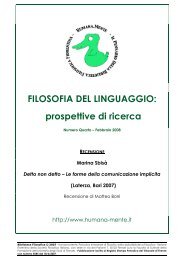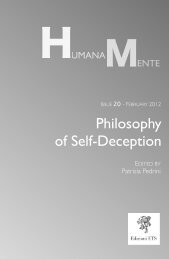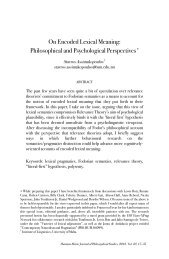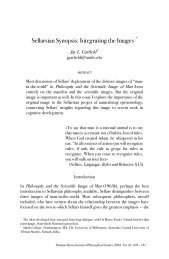- Page 1 and 2: UMANA ENTE ISSUE 15 - JANUARY 2011
- Page 3 and 4: TABLE OF CONTENTS FOREWORD Duccio M
- Page 5: Daniel M. Wegner - The Illusion of
- Page 9 and 10: Introduction - Agency: From Embodie
- Page 11 and 12: Introduction - Agency: From Embodie
- Page 13 and 14: Introduction - Agency: From Embodie
- Page 15 and 16: Introduction - Agency: From Embodie
- Page 17 and 18: Dynamics, Agency and Intentional Ac
- Page 19 and 20: M. Silberstein & A. Chemero - Dynam
- Page 21 and 22: M. Silberstein & A. Chemero - Dynam
- Page 23 and 24: M. Silberstein & A. Chemero - Dynam
- Page 25 and 26: M. Silberstein & A. Chemero - Dynam
- Page 27 and 28: M. Silberstein & A. Chemero - Dynam
- Page 29 and 30: M. Silberstein & A. Chemero - Dynam
- Page 31 and 32: M. Silberstein & A. Chemero - Dynam
- Page 33 and 34: M. Silberstein & A. Chemero - Dynam
- Page 35 and 36: M. Silberstein & A. Chemero - Dynam
- Page 37 and 38: An Inter-Enactive Approach to Agenc
- Page 39 and 40: S. Torrance & T. Froese - An Inter-
- Page 41 and 42: S. Torrance & T. Froese - An Inter-
- Page 43 and 44: S. Torrance & T. Froese - An Inter-
- Page 45 and 46: S. Torrance & T. Froese - An Inter-
- Page 47 and 48: S. Torrance & T. Froese - An Inter-
- Page 49 and 50: S. Torrance & T. Froese - An Inter-
- Page 51 and 52: S. Torrance & T. Froese - An Inter-
- Page 53 and 54: S. Torrance & T. Froese - An Inter-
- Page 55 and 56: S. Torrance & T. Froese - An Inter-
- Page 57 and 58:
S. Torrance & T. Froese - An Inter-
- Page 59 and 60:
S. Torrance & T. Froese - An Inter-
- Page 61 and 62:
S. Torrance & T. Froese - An Inter-
- Page 63 and 64:
S. Torrance & T. Froese - An Inter-
- Page 65 and 66:
S. Torrance & T. Froese - An Inter-
- Page 67 and 68:
S. Torrance & T. Froese - An Inter-
- Page 69 and 70:
S. Torrance & T. Froese - An Inter-
- Page 71 and 72:
Strong Interaction and Self-Agency
- Page 73 and 74:
Shaun Gallagher - Strong Interactio
- Page 75 and 76:
Shaun Gallagher - Strong Interactio
- Page 77 and 78:
Shaun Gallagher - Strong Interactio
- Page 79 and 80:
Shaun Gallagher - Strong Interactio
- Page 81 and 82:
Shaun Gallagher - Strong Interactio
- Page 83 and 84:
Shaun Gallagher - Strong Interactio
- Page 85 and 86:
Shaun Gallagher - Strong Interactio
- Page 87 and 88:
Shaun Gallagher - Strong Interactio
- Page 89 and 90:
Shaun Gallagher - Strong Interactio
- Page 91 and 92:
Shaun Gallagher - Strong Interactio
- Page 93 and 94:
The Phenomenology of Agency and Fre
- Page 95 and 96:
Terry Horgan - The Phenomenology of
- Page 97 and 98:
Terry Horgan - The Phenomenology of
- Page 99 and 100:
Terry Horgan - The Phenomenology of
- Page 101 and 102:
Terry Horgan - The Phenomenology of
- Page 103 and 104:
Terry Horgan - The Phenomenology of
- Page 105 and 106:
Terry Horgan - The Phenomenology of
- Page 107 and 108:
Terry Horgan - The Phenomenology of
- Page 109 and 110:
Terry Horgan - The Phenomenology of
- Page 111 and 112:
Terry Horgan - The Phenomenology of
- Page 113 and 114:
Terry Horgan - The Phenomenology of
- Page 115 and 116:
The Decisions of Consciousness and
- Page 117 and 118:
M. Maldonato - The Decisions of Con
- Page 119 and 120:
M. Maldonato - The Decisions of Con
- Page 121 and 122:
M. Maldonato - The Decisions of Con
- Page 123 and 124:
M. Maldonato - The Decisions of Con
- Page 125 and 126:
M. Maldonato - The Decisions of Con
- Page 127 and 128:
M. Maldonato - The Decisions of Con
- Page 129 and 130:
M. Maldonato - The Decisions of Con
- Page 131 and 132:
M. Maldonato - The Decisions of Con
- Page 133 and 134:
M. Maldonato - The Decisions of Con
- Page 135 and 136:
M. Maldonato - The Decisions of Con
- Page 137 and 138:
Epistemic Trust. Outline for a Phen
- Page 139 and 140:
Roberta De Monticelli - Epistemic T
- Page 141 and 142:
Roberta De Monticelli - Epistemic T
- Page 143 and 144:
Roberta De Monticelli - Epistemic T
- Page 145 and 146:
Roberta De Monticelli - Epistemic T
- Page 147 and 148:
Roberta De Monticelli - Epistemic T
- Page 149 and 150:
Roberta De Monticelli - Epistemic T
- Page 151 and 152:
Roberta De Monticelli - Epistemic T
- Page 153 and 154:
Roberta De Monticelli - Epistemic T
- Page 155 and 156:
Perspectives on the Experience of W
- Page 157 and 158:
D. Rigoni, L.Sammicheli & M. Brass
- Page 159 and 160:
D. Rigoni, L.Sammicheli & M. Brass
- Page 161 and 162:
D. Rigoni, L.Sammicheli & M. Brass
- Page 163 and 164:
D. Rigoni, L.Sammicheli & M. Brass
- Page 165 and 166:
D. Rigoni, L.Sammicheli & M. Brass
- Page 167 and 168:
D. Rigoni, L.Sammicheli & M. Brass
- Page 169 and 170:
D. Rigoni, L.Sammicheli & M. Brass
- Page 171 and 172:
D. Rigoni, L.Sammicheli & M. Brass
- Page 173 and 174:
D. Rigoni, L.Sammicheli & M. Brass
- Page 175 and 176:
Initiation of Intentional Actions a
- Page 177 and 178:
S. Pockett - Initiation of Intentio
- Page 179 and 180:
S. Pockett - Initiation of Intentio
- Page 181 and 182:
S. Pockett - Initiation of Intentio
- Page 183 and 184:
S. Pockett - Initiation of Intentio
- Page 185 and 186:
S. Pockett - Initiation of Intentio
- Page 187 and 188:
S. Pockett - Initiation of Intentio
- Page 189 and 190:
S. Pockett - Initiation of Intentio
- Page 191 and 192:
S. Pockett - Initiation of Intentio
- Page 193 and 194:
The Dynamics of Acting Mark H. Bick
- Page 195 and 196:
Mark H. Bickhard - The Dynamics of
- Page 197 and 198:
Mark H. Bickhard - The Dynamics of
- Page 199 and 200:
Mark H. Bickhard - The Dynamics of
- Page 201 and 202:
Mark H. Bickhard - The Dynamics of
- Page 203 and 204:
Mark H. Bickhard - The Dynamics of
- Page 205 and 206:
Deliberative Libertarianism * Jing
- Page 207 and 208:
Jing Zhu - Deliberative Libertarian
- Page 209 and 210:
Jing Zhu - Deliberative Libertarian
- Page 211 and 212:
Jing Zhu - Deliberative Libertarian
- Page 213 and 214:
Jing Zhu - Deliberative Libertarian
- Page 215 and 216:
Jing Zhu - Deliberative Libertarian
- Page 217 and 218:
Jing Zhu - Deliberative Libertarian
- Page 219 and 220:
Jing Zhu - Deliberative Libertarian
- Page 221 and 222:
Jing Zhu - Deliberative Libertarian
- Page 223 and 224:
Jing Zhu - Deliberative Libertarian
- Page 225 and 226:
Jing Zhu - Deliberative Libertarian
- Page 227 and 228:
Jing Zhu - Deliberative Libertarian
- Page 229 and 230:
The Non-Mysterious Flesh: Embodied
- Page 231 and 232:
Liz Disley - The Non-Mysterious Fle
- Page 233 and 234:
Liz Disley - The Non-Mysterious Fle
- Page 235 and 236:
Liz Disley - The Non-Mysterious Fle
- Page 237 and 238:
Liz Disley - The Non-Mysterious Fle
- Page 239 and 240:
Liz Disley - The Non-Mysterious Fle
- Page 241 and 242:
Liz Disley - The Non-Mysterious Fle
- Page 243 and 244:
Liz Disley - The Non-Mysterious Fle
- Page 245 and 246:
Liz Disley - The Non-Mysterious Fle
- Page 247 and 248:
Liz Disley - The Non-Mysterious Fle
- Page 249 and 250:
Liz Disley - The Non-Mysterious Fle
- Page 251 and 252:
Liz Disley - The Non-Mysterious Fle
- Page 253 and 254:
Practical Intentionality: A Balance
- Page 255 and 256:
Susi Ferrarello - Practical Intenti
- Page 257 and 258:
Susi Ferrarello - Practical Intenti
- Page 259 and 260:
Susi Ferrarello - Practical Intenti
- Page 261 and 262:
Susi Ferrarello - Practical Intenti
- Page 263 and 264:
Susi Ferrarello - Practical Intenti
- Page 265 and 266:
Susi Ferrarello - Practical Intenti
- Page 267 and 268:
Is Balancing Emblematic of Action T
- Page 269 and 270:
David Vender - Is Balancing Emblema
- Page 271 and 272:
David Vender - Is Balancing Emblema
- Page 273 and 274:
David Vender - Is Balancing Emblema
- Page 275 and 276:
David Vender - Is Balancing Emblema
- Page 277 and 278:
David Vender - Is Balancing Emblema
- Page 279 and 280:
David Vender - Is Balancing Emblema
- Page 281 and 282:
David Vender - Is Balancing Emblema
- Page 283 and 284:
David Vender - Is Balancing Emblema
- Page 285 and 286:
David Vender - Is Balancing Emblema
- Page 287 and 288:
Book Review Effective Intentions: T
- Page 289 and 290:
Book Review - Effective Intentions
- Page 291 and 292:
Book Review - Effective Intentions
- Page 293 and 294:
Book Review The Actor‟s Brain: Ex
- Page 295 and 296:
Book Review - The Actor‟s Brain 2
- Page 297 and 298:
Book Review - The Actor‟s Brain 2
- Page 299 and 300:
Book Review Cognitive Systems and t
- Page 301 and 302:
Book Review - Cognitive Systems and
- Page 303 and 304:
Book Review - Cognitive Systems and
- Page 305 and 306:
Book Review - Cognitive Systems and
- Page 307 and 308:
Book Review Embodied Cognition Laur
- Page 309 and 310:
to shed light on information proces
- Page 311 and 312:
Book Review Siamo davvero liberi Le
- Page 313 and 314:
Book Review - Siamo davvero liberi
- Page 315 and 316:
Book Review - Siamo davvero liberi
- Page 317 and 318:
Book Review - Siamo davvero liberi
- Page 319 and 320:
Book Review Out of Our Heads: Why Y
- Page 321 and 322:
Book Review - Out of Our Heads 305
- Page 323 and 324:
Book Review Radical Embodied Cognit
- Page 325 and 326:
Book Review - Radical Embodied Cogn
- Page 327 and 328:
Book Review - Radical Embodied Cogn
- Page 329 and 330:
Commentary From the Puzzle of Quali
- Page 331 and 332:
Commentary - From the Puzzle of Qua
- Page 333 and 334:
Commentary - From the Puzzle of Qua
- Page 335 and 336:
Commentary Neurophilosophy of Free
- Page 337 and 338:
Commentary - Neurophilosophy of Fre
- Page 339 and 340:
Commentary - Neurophilosophy of Fre
- Page 341 and 342:
Commentary - Neurophilosophy of Fre
- Page 343 and 344:
Commentary The Illusion of Consciou
- Page 345 and 346:
Commentary - The Illusion of Consci
- Page 347 and 348:
Commentary - The Illusion of Consci
- Page 349 and 350:
Commentary - The Illusion of Consci
- Page 351 and 352:
Commentary - The Illusion of Consci
- Page 353 and 354:
Commentary - The Illusion of Consci
- Page 355 and 356:
Commentary - The Illusion of Consci
- Page 357 and 358:
Commentary The Volitional Brain B.
- Page 359 and 360:
Commentary - The Volitional Brain 3
- Page 361 and 362:
Commentary - The Volitional Brain 3
- Page 363 and 364:
Commentary Living Without Free Will
- Page 365 and 366:
Commentary - Living Without Free Wi
- Page 367 and 368:
Commentary - Living Without Free Wi
- Page 369 and 370:
Commentary - Living Without Free Wi
- Page 371 and 372:
Commentary - Living Without Free Wi
- Page 373 and 374:
Commentary - Living Without Free Wi
- Page 375 and 376:
Interview Sean Spence Edited by Duc
- Page 377 and 378:
Interview - Sean Spence 361 3. Do y
- Page 379 and 380:
Interview - Sean Spence 363 discrep
- Page 381 and 382:
Interview - Sean Spence 365 functio
- Page 383 and 384:
Interview - Sean Spence 367 REFEREN
- Page 385 and 386:
Interview Daniel Dennett Edited by
- Page 387 and 388:
Interview - Daniel Dennett 371 3. Y
- Page 389 and 390:
Interview - Daniel Dennett 373 our
- Page 391 and 392:
Interview - Daniel Dennett 375 prin
- Page 393 and 394:
Interview - Daniel Dennett 377 Yes,
- Page 395 and 396:
Interview - Daniel Dennett 379 chil
- Page 397 and 398:
Interview - Daniel Dennett 381 19.
- Page 399 and 400:
Report Truth, Knowledge and Reality
- Page 401 and 402:
Report - Truth, Knowledge and Reali
- Page 403 and 404:
HUMANA.MENTE - ISSUE 15, JANUARY 20


